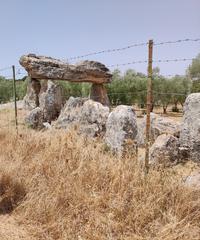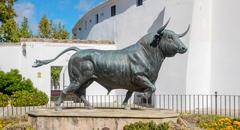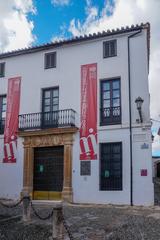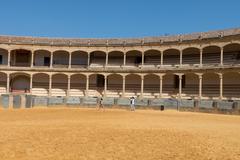Necrópolis De La Planilla: Visiting Hours, Tickets, and Historical Sites in Ronda, Spain
Date: 14/06/2025
Introduction
Nestled just outside Ronda, in the heart of Málaga province, the Necrópolis De La Planilla stands as a testament to the region’s deep prehistoric roots. This megalithic necropolis, dating from the late Neolithic to Bronze Age (ca. 3000–1500 BCE), represents one of southern Spain’s most important archaeological sites. Offering a unique glimpse into ancient funerary customs, social structures, and architectural traditions, La Planilla is an essential stop for enthusiasts of history, archaeology, and Andalusian culture. This comprehensive guide covers everything you need for an informed visit—including hours, ticketing, access, guided tours, and nearby historical attractions.
For further details and updates, consult the Ronda Tourist Office, Wikipedia’s entry on Necrópolis Megalítica de La Planilla, and in-depth local reporting from Diario Sur.
Table of Contents
- Introduction
- Historical Context and Cultural Significance
- Archaeological Significance and Site Description
- Practical Visitor Information
- Location and How to Get There
- Guided Tours and Visitor Services
- Facilities, Accessibility, and Safety
- Nearby Attractions in Ronda
- Frequently Asked Questions (FAQ)
- Conservation and Research
- Travel Tips and Summary
Historical Context and Cultural Significance
Origins and Prehistoric Context
Necrópolis De La Planilla dates back to the late Neolithic and Chalcolithic periods, with continued use into the Bronze Age. Its collective tombs and grave goods—pottery, tools, and ornaments—reflect the evolution from nomadic groups to settled, agricultural communities. The necropolis stands as part of a broader network of megalithic sites in the Serranía de Ronda, a region known for its high density of prehistoric monuments and early settlements (Wikipedia).
Cultural Connections
The corridor-type dolmens, constructed with upright orthostats and massive covering slabs, indicate advanced communal organization and ritualized burial customs. These structures reveal cultural exchanges with other Mediterranean and Atlantic societies, underscoring La Planilla’s importance in understanding the spread of megalithic traditions. The necropolis also provides archaeological links to settlements such as the Copper Age community on Ronda’s La Ciudad plateau (Diario Sur).
Archaeological Significance and Site Description
La Planilla is built atop a flat hill overlooking the Guadalevín River and Culebras stream. The location offered both a defensible position and symbolic value, as was common in prehistoric burial practices. The site mainly consists of corridor-type dolmens with trapezoidal or rectangular chambers. Key features include:
- Corridors: Narrow passages, lined with upright stones, leading into the burial chambers.
- Chambers: Large spaces for collective interment, constructed with massive stone slabs.
- Covering Slabs: Horizontal stones forming the tomb roofs, some of which remain intact.
- Stone Fills: Smaller stones at the tomb’s head, thought to reinforce the structure.
Although only four tombs have been extensively excavated, surface evidence suggests more remain undiscovered. The best-preserved, Sepulcro 1, features several original covering slabs and remnants of the entrance orthostats (Wikipedia).
Practical Visitor Information
Visiting Hours and Tickets
- Hours: Generally open from 9:00 AM to 6:00 PM daily. Seasonal variations may occur; check the official tourism site before visiting.
- Entry: Access is typically free. Guided tours or special events may require advance booking and have associated fees (Discover Ronda History).
- Online Booking: Recommended for guided tours or during peak periods.
Accessibility
Paths are uneven and may be challenging for visitors with mobility issues. Sturdy walking shoes are strongly advised. Assistance may be arranged by contacting the visitor center in advance.
Location and How to Get There
- By Car: Ronda is accessible via highways from Málaga, Seville, and Granada. Parking is available near the site, though spaces may be limited during busy seasons (Andalucia Lovers).
- By Public Transport: Regular trains and buses connect Ronda to major cities. From the station, take a taxi or enjoy a scenic 20–30 minute walk to the necropolis (Ronda Today).
- On Foot: The site is reachable by foot from central Ronda, but expect some uneven ground en route.
Guided Tours and Visitor Services
- Guided Tours: Offered in Spanish and English, typically lasting around one hour. Booking ahead is advised, especially during special events or high season.
- Audio Guides: Downloadable audio guides (such as VoiceMap Audio Guide) are available for self-guided exploration.
- Visitor Amenities: While facilities at the site are minimal, restrooms, cafés, and shops are available in Ronda’s city center.
Facilities, Accessibility, and Safety
- Facilities: Limited at the site; plan to use facilities in town.
- Accessibility: Not fully wheelchair accessible due to rocky, uneven terrain.
- Safety Tips: Supervise children; avoid visiting during midday summer heat; bring water, sun protection, and a hat.
Nearby Attractions in Ronda
Enhance your visit by exploring other significant sites:
- Cueva de la Pileta: Paleolithic cave with ancient paintings (Ronda Experience).
- Acinipo (Ronda la Vieja): Roman city ruins with a well-preserved amphitheater (Andalucia in My Pocket).
- Municipal Museum of Ronda: Housed in Mondragón Palace, features artifacts from La Planilla and other periods.
- Puente Nuevo and Baños Árabes: Ronda’s iconic bridge and preserved Arab baths (Spain.info; Explored by Marta).
Frequently Asked Questions (FAQ)
Q: What are the visiting hours for Necrópolis De La Planilla?
A: Generally open 9:00 AM to 6:00 PM daily, but subject to seasonal changes. Always check official sources before visiting.
Q: Is there an entry fee?
A: Admission is usually free; guided tours may have a fee.
Q: Are guided tours available?
A: Yes, in Spanish and English. Reserve in advance for guaranteed availability.
Q: Is the site accessible for wheelchairs?
A: Accessibility is limited due to uneven terrain.
Q: What should I bring?
A: Sturdy shoes, water, sun protection, and a camera.
Conservation and Research
Ongoing archaeological excavations and conservation efforts are crucial to preserving La Planilla’s delicate structures. Techniques such as ground-penetrating radar and material analysis continue to reveal new insights about prehistoric Ronda (Diario Sur).
Travel Tips and Summary
- Plan Your Visit: Spring and autumn offer the most comfortable weather.
- Combine Attractions: Pair La Planilla with Acinipo, Cueva de la Pileta, and the Municipal Museum for a holistic experience.
- Book Ahead: For guided tours and during peak travel periods, secure your spot in advance.
- Stay Informed: Use resources such as the Ronda Tourist Office, Ronda Experience, and Discover Ronda History for the latest updates.
The Necrópolis De La Planilla offers a compelling journey through millennia of human history, set against the dramatic landscapes of Andalusia. With careful planning and respect for the site’s heritage, your visit will be both educational and memorable.
Sources
- Discover Ronda History
- Necrópolis Megalítica de La Planilla - Wikipedia
- Puesta en valor de los dólmenes en la Serranía de Ronda, Diario Sur
- Necrópolis De La Planilla Visiting Hours, Tickets, and Guide to Ronda’s Historical Site
- Necrópolis De La Planilla Visiting Hours, Tickets & Nearby Historical Sites in Ronda
- Andalucia Lovers - How to get to Ronda
- Ronda Today - Getting Here
- Andalucia in My Pocket - Visit the Roman Ruins of Acinipo
- Spain.info - Ronda Destination
- VoiceMap Audio Guide for Ronda
- Explored by Marta
- All About Eve’s Journeys



